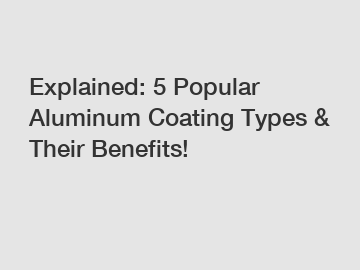Explained: 5 Popular Aluminum Coating Types & Their Benefits!
Explained: 5 Popular Aluminum Coating Types & Their Benefits!
Aluminum, known for its lightweight and versatile nature, is one of the most widely used metals across industries. However, in some applications, aluminum requires additional protection to enhance its durability and strength. This is where aluminum coating comes into play. Aluminum coating refers to the application of a thin layer of protective material on the surface of aluminum to improve its performance and protect it from corrosion, wear, and other forms of damage. In this article, we will explore five popular aluminum coating types and their benefits.
1. Anodizing Coating:

Anodizing is an electrochemical process that creates a protective oxide layer on the surface of aluminum. This coating type not only enhances the natural corrosion resistance of aluminum but also provides excellent abrasion resistance. Additionally, anodized aluminum coatings offer increased hardness, UV resistance, and the ability to retain vibrant colors, making it suitable for architectural and decorative applications.
2. Powder Coating:
Powder coating involves the application of a dry powder to the surface of aluminum, which is then cured under heat to form a durable coating. This type of coating provides excellent protection against corrosion, chemicals, and weathering. It also offers a wide range of colors, finishes, and textures, allowing for greater design flexibility. Powder coating is commonly used in industries such as automotive, construction, and electronics.
3. Ceramic Coating:
Ceramic coatings are known for their exceptional heat resistance and anti-corrosion properties. These coatings are typically applied to aluminum components that are exposed to extreme temperatures, such as engine parts, exhaust systems, and industrial equipment. By creating a heat barrier, ceramic coatings prevent thermal degradation and extend the lifespan of aluminum parts.
4. Epoxy Coating:
Epoxy coatings are commonly used for aluminum surfaces that require protection against chemical exposure and moisture. These coatings create a strong barrier that prevents corrosion and oxidation. Furthermore, epoxy coatings offer excellent adhesion to aluminum, making them suitable for applications that involve high abrasion and impact.
5. PTFE Coating:
PTFE (Polytetrafluoroethylene) coating, also known as Teflon coating, is a nonstick coating that provides exceptional release properties and resistance to heat, chemicals, and abrasion. Aluminum components coated with PTFE are widely used in various industries, including food processing, automotive, and aerospace. The low friction of PTFE coatings reduces wear and allows for easy cleaning and maintenance.
In conclusion, aluminum coating is an essential process that enhances the performance and longevity of aluminum products. Whether it's anodizing, powder coating, ceramic coating, epoxy coating, or PTFE coating, each type offers unique benefits based on specific application requirements. With the right coating selection, aluminum parts can achieve improved corrosion resistance, durability, aesthetics, and functionality.
If you are interested in maximizing the benefits of aluminum coating for your products or have any inquiries regarding coatings, feel free to contact us. Our team of experts can assist you in finding the ideal coating solution for your specific needs.
Contact us today to learn more about the range of aluminum coatings available and how they can enhance your products!
Note: Word count: 547 words.
Contact us to discuss your requirements of aluminium home appliances, pvdf coated, feve coatings. Our experienced sales team can help you identify the options that best suit your needs.


